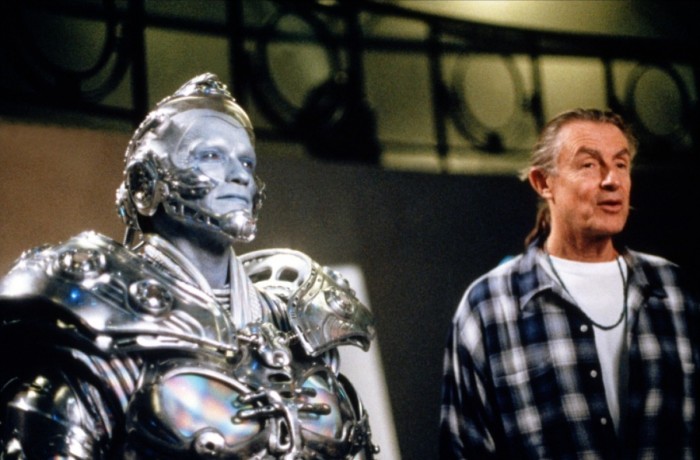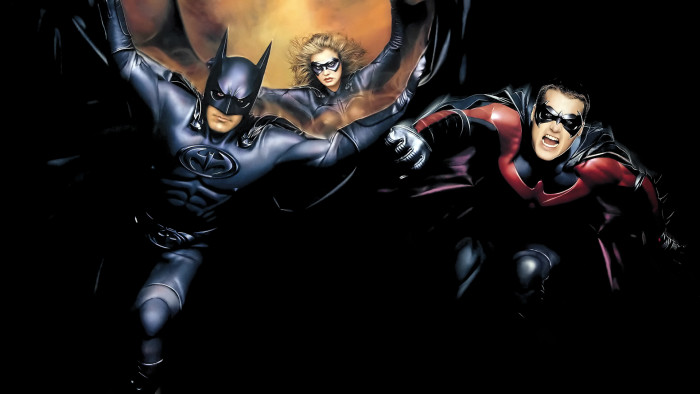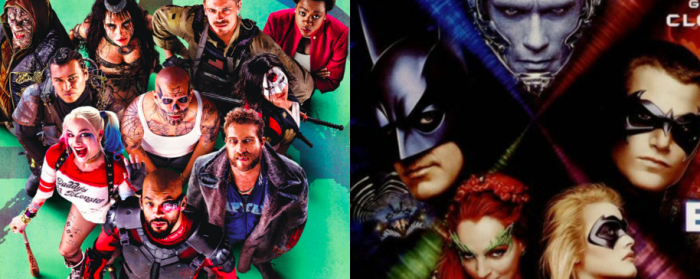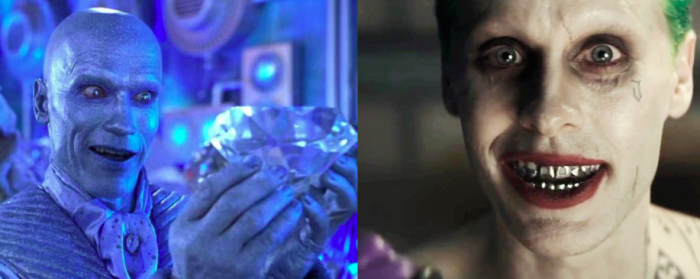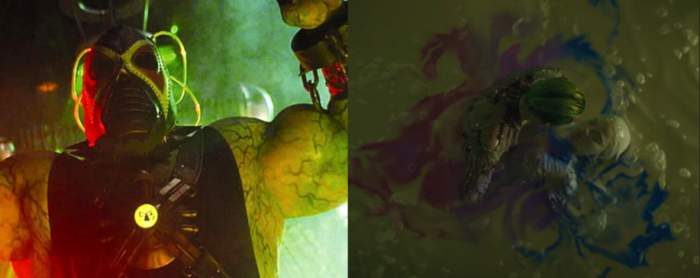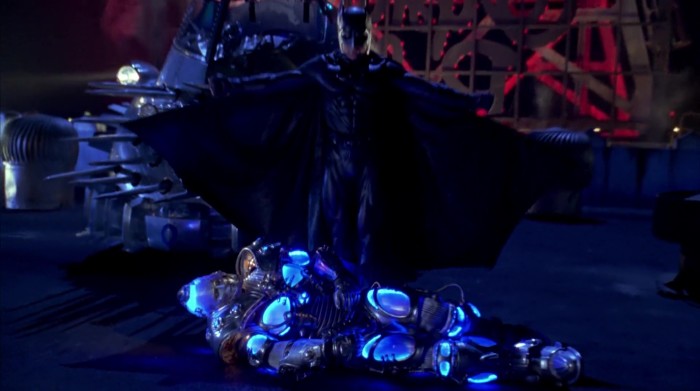What 'Batman & Robin' Can Teach Us On Its 20th Anniversary
Often when we look at movies that defined our youth, we attempt to cling onto some aspect of nostalgia that can repair any visible flaws. Maybe it saved you from the boredom of summer. Maybe it kept you company during a sick day at home. Everyone has that movie, the one they will defend against any sort of criticism, and for the longest time (until I turned into some form of grown adult), that movie was Batman & Robin.
Now, looking back on it 20 years later, it is quite clear that my tastes have changed since June of 1997. No longer am I entertained by Uma Thurman dancing in a gorilla get-up, nor do I accept that dumbed-down version of Barbara Gordon, and I can now completely confirm that I will absolutely, one hundred percent, never register for a Bat Credit Card.
But there is a much more deeper question to ask when it comes to this anniversary post: what can we actually learn from Batman & Robin? Is it an important film in the legacy of DC's live action adaptation history? Well chill, because we're going to examine this one from top-to-bottom. Let's explore the good, the bad, and the Bane of Joel Schumacher's "masterpiece" and what it has taught the comic book genre over the years. Instead of hating it, maybe we can thank Papa Joel for giving us a guidebook on what Batman movies shouldn't be.
“Bombs away, Batman!”
When looking at Batman as a property, one can clearly find a divide between his comic book version and his cinematic counterpart around the mid-90's. On the page and animated TV screen, Batman was dark and brooding. He had a sense of justice before any sort of personal gain, along with a somewhat introverted nature. Movie Batman shared these qualities during the Burton years, with the darkness sometimes tipping the scale over the lighter aspects of the character. Unfortunately, this version of the Dark Knight left many families disappointed, thus resulting in Batman Returns not being the box office juggernaut that Warner Bros. wanted (especially when compared to the first movie).
Enter Joel Schumacher and screenwriter Akiva Goldsman, who (with their work on Batman Forever) turned Burton's version into a hero that smiles and speaks sassy catchphrases. The dark and twisted villains like Catwoman and Penguin were traded for more colorful antagonists, including Jim Carrey as a neon green Riddler and Tommy Lee Jones as a manic and over-the-top Two-Face. Even the memorable score by Danny Elfman was switched out for a slightly more upbeat score by Elliot Goldenthal. Obviously, the caped crusader that had been established on the silver screen in 1989 was shifting into the one that Warner Bros. felt could be more approachable (and profitable).
The irony of this, from my personal perspective, is that Batman Forever actually scared me more than Batman Returns. Maybe the '90s animated series had preconditioned me in the best way possible, but the muted tones of Burton's Gotham put me more at ease as a child than Schumacher's overwhelming rendition of Batman. There was just too much happening. Between the shift in humor, sexual overtones, ridiculous villains, and Val Kilmer's creepy vocal delivery, young me was just not having it.
But when trailers started popping left and right for Batman and Robin, I had mentally prepared myself to see the next installment in Batman's movie adventures. And during that first viewing, I was entertained. Yet even at such a young age, there was a feeling deep in my core that this was a strange experience. Perhaps this was the birth of my love of bad cinema, or just me being in denial, but it was a sensation that I've only recently put a finger on.
But my fascination with the movie was not shared by the rest of the world. Financially, it is still the lowest grossing live action Batman film to date. And with it holding 10% rating on Rotten Tomatoes, Batman & Robin did a fine job in killing Batman's cinematic potential for the better part of a decade.
"To succeed, we only need to pick a star and follow it."
It is important to know that, when Batman & Robin was in pre-production, Joel Schumacher was at a strange fork in the cinematic road. He either could attempt to make a truly great sequel to his first Batman movie or fall under the pressure of Warner Bros., who wanted the greatest toy commercial of all time. And if you've seen the finished product, you know what road he turned his Batmobile toward.
There are times though when a comic book movie can be more than just a way to sell action figures and instead strive to tell a legitimately good story – and we can thank Joel Schumacher for paving the way for Christopher Nolan. Of course, I'm talking, about Batman Begins, the 2005 movie that revitalized Batman's image. Though it was a gamble for Warner Bros. to even hire such a young filmmaker who was, at the time, unproven in the big-budget arena, they needed someone with fresh ideas to reboot the character for modern audiences. And with his melding of Hitchcock-ian mystery and attention to realism (which he previously showcased in movies like Memento and Insomnia), Nolan was just that guy to lead the charge.
It's interesting to see how many of the plot elements of Begins come from abandoned ideas that Schumacher himself suggested for cancelled or dismissed Batman projects, including the use of the Scarecrow as the main villain and the suggestion of making a Batman prequel movie based on Frank Miller's Year One series. And though it would have been entertaining to see some of Schumacher's ideas come to the big screen (Nicolas Cage as Scarecrow, anyone?), we can all agree that everything worked out for the best.
Instead of focusing on the possibilities of making the character profitable and interesting to families, Nolan developed a Batman that could exist in a post- 9/11 environment. Schumacher's Gotham is not a believable place, but rather exists more as an overcooked, colorful fantasy. It's clear this was done to be more inviting to kids, especially since much of the designs (such as the vehicles) came from the many partnering toy companies working with the studio. Nolan, on the other hand, filmed in parts of Chicago – his Gotham was just as real as the cities you see on the news.
The same can be said of Christian Bale's take on Bruce Wayne, who couldn't be more different than the emotionless pretty boy of George Clooney's performance. In fact, Bale understands the three sides of Batman: the man who the public sees, the one that Alfred knows, and the crime fighter that bad guys fear. Clooney plays the character as if these three elements don't exist, while Bale makes them all uniquely his own. To best understand (and respect) Batman, we have to witness all those facets of his personality.
Though there is the myth that kids will buy into anything, there's a clause in that formula: the fantasy has to be believable and Schumacher's Batman & Robin is nothing of the sort. Though Batman Begins might not exactly be the best example of something that audiences of all ages adore, if we look at DC's competition, Marvel is the one that gets this right. Yes, Thor and Loki exist in the same world as Tony Stark and Spider-Man, but audiences buy into this universe because these characters and their world feel organic and their relationships make sense. It might have ridiculous visuals and action sequences, but you never question the legitimacy of what's in front of you.
This is a lesson that only Warner Bros. is recently starting to understand in their own comic book films, and with Justice League, we will have to see how much they've taken from both Nolan's successes and Schumacher's flaws to create something that functions better than a colorful, feature-length music video that exists only to spawn more movies.
Speaking of which....
"If I must suffer, humanity will suffer with me."
Ah, Suicide Squad. If there was any movie post-Batman & Robin that felt like it exists in the same world as Schumacher's, this would be it. From the obnoxious editing, loud music choices, and grotesque color palette, Suicide Squad is basically like the cool Tumblr approved reboot of everything Schumacher and Goldsman dreamed of making a reality in the Batman universe.
Okay, okay, Suicide Squad isn't as bad as Batman & Robin, but it's walking on thin ice (pun intended.) There are a few things that save it overall, mainly being two very specific ingredients that Batman & Robin lacked: a mixture of interesting (and sometimes great) performances and a tiny pinch of real world "edgy" grit.
First, let's take a look at Suicide Squad's cast of actors and characters. When comparing glittery neon decorated apples to similar colored oranges, the individuals that inhabit the world of Gotham in Batman & Robin are very one note, both in how they're written in the script and how they come off when performed by their various actors. We've already gone over how flat and lifeless George Clooney was in this movie, but on the opposite side of the spectrum is Arnold Schwarzenegger's Mr. Freeze.
During pre-production, Joel Schumacher had originally looked at actors such as Patrick Stewart, Anthony Hopkins, and Ed Harris as the possible choices for the role of Batman's coldest enemy. But if you thought that pun I just wrote was terrible, nothing will ever be quite as bad as the dialogue that was written for the Terminator himself to recite. Every line out of Schwarzenegger's mouth is truly unbearable, especially since Schumacher's direction strangles any potential emotion out of every scene. The worst of these cases is the moment when Freeze watches home movies of his sick wife on his various ice-framed TV's. Rather than feeling his pain, we laugh at it, which I'm sure was not the intended response.
For comparison, let's take a look at another over-the-top villain, specifically the Joker from Suicide Squad. Played by Jared Leto, this criminal might seem just as ridiculous as Mr. Freeze, but what makes Leto's Mr. J steps above Arnold's performance is simple enough: he is acting the hell out of this role. Say what you will about the behind-the-scenes tales of him presenting dead rats to his co-stars, but Leto is bringing his everything to the famous Prince of Crime. You feel his intensity and his lust for Harley – he makes the chaotic script work in his favor.
Then there is Suicide Squad's atmosphere. When you look at Schumacher's Batman films, you can't help but note the flare of bright colors mixed with those exaggerated, cartoonishly gothic tones. What is supposed to feel "edgy" becomes too polished, too clean, to ever be taken seriously.
Let's take Bane's transformation scene as an example. Letting go of the fact that Batman & Robin doesn't understand this character in the slightest, this moment is colored in a muted (almost vomit) shade of green, with the characters lit from below. As an audience, this, along with the spooky laboratory setting and over-the-top villainous performances, are supposed to invoke fear. Instead every prop, actor, and costume just feels too strategized, too choreographed. It feels fake in the worst possible way.
But if we look at Suicide Squad's origin of Harley Quinn (specifically the acid sequence), you can see a refined take on this approach. Of course, the acting here is just as oversized as it is in the rest of the movie, but when it comes to the cinematography, it expresses Harley's unsettling attraction and fear of Mr. J perfectly. Rather than being distracted by the garish color palette and sets of Schumacher's Gotham, we are only given Harley and Joker's signature shades once they come up from the acid, allowing us to focus more on the "birth" of their destructive romance.
Though none of these examples put a true bandage over the mess that is Suicide Squad, it might help to answer an even more important question: Is DC and Warner Bros. really learning from their more recent successes, or could they have a future Schumacher-like flop occurring in the near future?
“First Gotham, and then the world!”
When you look at the current upcoming slate of DC films on Warner Bros. calendar, you'll notice their desperation to build a beloved and successful superhero universe. Thankfully, Wonder Woman has taken the pressure off of WB, due to the movie being a hit with both critics and audiences, which can't be said for 2016's Batman v. Superman or Suicide Squad. But do the next crop of cinematic adventures for DC's beloved characters scream the kind of success that Wonder Woman is having as a global movie event? Personally, I don't think so.
The next movie to come down the DC pipeline is Justice League, which is experiencing some drama behind-the-scenes. Original director Zack Snyder departed the production following his daughter's passing, only to be replaced by Marvel's former golden boy, Joss Whedon. The results of this move are anyone's guess. Judging by the trailers, the various issues that arose in Snyder's Batman v. Superman seem to have been adjusted, setting us up for some slightly more lighter fare. But look at it this way: we could be traveling down a familiar and dangerous road, since this hard course correction and change in tone was what got us Batman & Robin-type results in the first place 20 years ago.
So with all these projects, plus Aquaman, The Flash and The Batman, there is a worry that Warner Bros. is becoming too concerned with how the public reacts to their films. There's a distinct lack of confidence in this DCEU at the moment – their press releases have ended up sounding more in line with the Chamberlain from The Dark Crystal. Warner Bros.' anxiety is why Suicide Squad was handed to a trailer company for an edit. And let's not even get started on that ridiculous montage in Batman v. Superman where Diana watches Lex Luthor's YouTube channel dedicated to Justice League members.
So consider all of this a warning. Warner Bros.! Think of Batman & Robin as Doc Brown telling you (the Marty in this situation) to learn from your past. You need to remember that films should be made from an organic, creative place, and that the financial results should come second. Yes, Hollywood is a business, but somehow that same environment let people like Tim Burton and Christopher Nolan create their excellent Batman movies. You're doing good with hiring Matt Reeves, but let him make the movie he wants to. Because the sins of 1997 could return to haunt you.
With all of that said: Happy Anniversary to Batman & Robin! Because through all of the cringe-filled laughs, embarrassing lines, and crotch shots, you still are an entertaining example of how messed-up the Hollywood of the '90s and beyond can be! And even with every angry nerd rant on YouTube about your existence, we still secretly love all the ridiculous things you got away with. So thanks for the memories, the lessons, and the excuse to use you as a punching bag. 20 years later, it's all still ice levels of cool.

